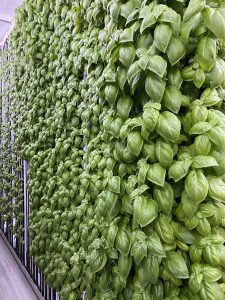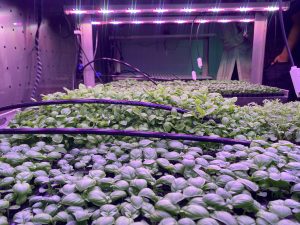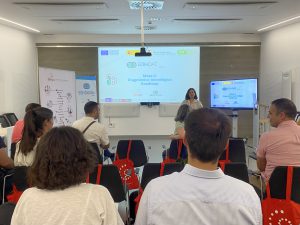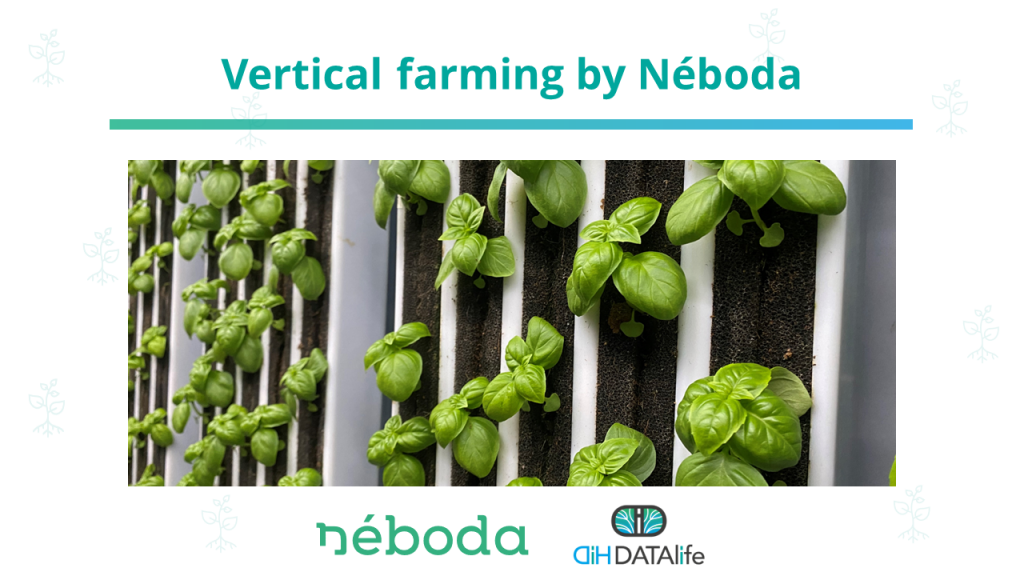 The DATAlife team travelled to Vigo on October 10 to learn about the work carried out by Néboda. This company showed us how they manage to harvest high-quality vegetables by applying the concepts of indoor vertical farming. We were also able to observe how they optimize their production processes by applying sensorization, robotization, artificial vision and data architecture technologies.
The DATAlife team travelled to Vigo on October 10 to learn about the work carried out by Néboda. This company showed us how they manage to harvest high-quality vegetables by applying the concepts of indoor vertical farming. We were also able to observe how they optimize their production processes by applying sensorization, robotization, artificial vision and data architecture technologies.
The visit began at the University of Vigo, with a tour of the spaces where Néboda has its R+D core, and ended at the Vigo company’s own facilities, where they grow vegetables such as basil, mustard or arugula, among others.
Néboda has been researching and experimenting with vertical farming for years. They have replaced the land with the cultivation of aromatic plants and leafy vegetables with a minimum supply of water and without phytosanitary products. They have tanks in which the water is recirculated, allowing nothing to be lost and saving on consumption, as well as improving the sustainability of the process.
An efficient cultivation method
The method they use to grow the plants is hydroponic. They use mineral solutions instead of agricultural soil, so the vegetables receive a nutrient, balanced solution dissolved in water, giving them the nourishment they need at all times.
They have managed to create a completely controlled environmental environment, maintaining optimal temperature and humidity and constant regulation of the light required by the plants.

It should be noted that these plants need a higher concentration of carbon for their proper development. That is why, at Néboda, they are already working on establishing collaborations with other startups that are dedicated to capturing carbon from the atmosphere to be able to channel it to their facilities and, there, enrich it for their crops. So, they can act as CO2 sinks.
Finally, they told us about their next steps. The company from Vigo is committed to automation and they are going to launch a robot that will access each of the cultivation ponds that will allow an analysis of the growth parameters of the plants. Through an artificial vision camera, the robot will take images of the crops and monitor the state of the vegetables in real time. This will allow for more efficient and automated monitoring, as well as better data collection and analysis.
The end consumers, currently, are restaurants that are committed to the fresh and powerful flavours offered by these plants and that have been achieved thanks to this new cultivation method. For now, they produce on a small scale, but they plan to be present in the retail channel in the short term.
Biotechnology sectoral task force
 This visit was part of the round table we held on October 10 on the biotechnology sector. These meetings between companies are part of the EDIH DATAlife project and aim to improve knowledge of technologies and the adoption of digital strategies from a sectoral point of view, based on the real needs of each ecosystem. We also help companies find digital solution providers.
This visit was part of the round table we held on October 10 on the biotechnology sector. These meetings between companies are part of the EDIH DATAlife project and aim to improve knowledge of technologies and the adoption of digital strategies from a sectoral point of view, based on the real needs of each ecosystem. We also help companies find digital solution providers.
On this occasion, the purpose of the round table was to find out the level of implementation of digital technologies of the attending entities, in relation to the challenge selected in the first meeting: Lab 4.0. This meeting implied a visit to an entity in which the implementation of new technologies to improve production processes could be observed, so the facilities of Néboda Farms were visited.
To be able to carry out these conferences, we have the collaboration of our partners, the clusters that are part of the consortium of the EDIH DATAlife project. Bioga, the Business Technology Cluster of Life Sciences of Galicia, oversees developing, together with DATAlife, the tables oriented to the biotechnology sector.
The EDIH DATAlife project has a budget of almost 5.6 million euros and is funded by the European Commission, with DIGITAL EUROPE funds, and by the Ministry of Industry, Trade and Tourism, with NextGeneration funds. These have allowed us to deploy a portfolio of services to accelerate the digital transformation of companies by implementing disruptive technologies to increase their competitiveness.

